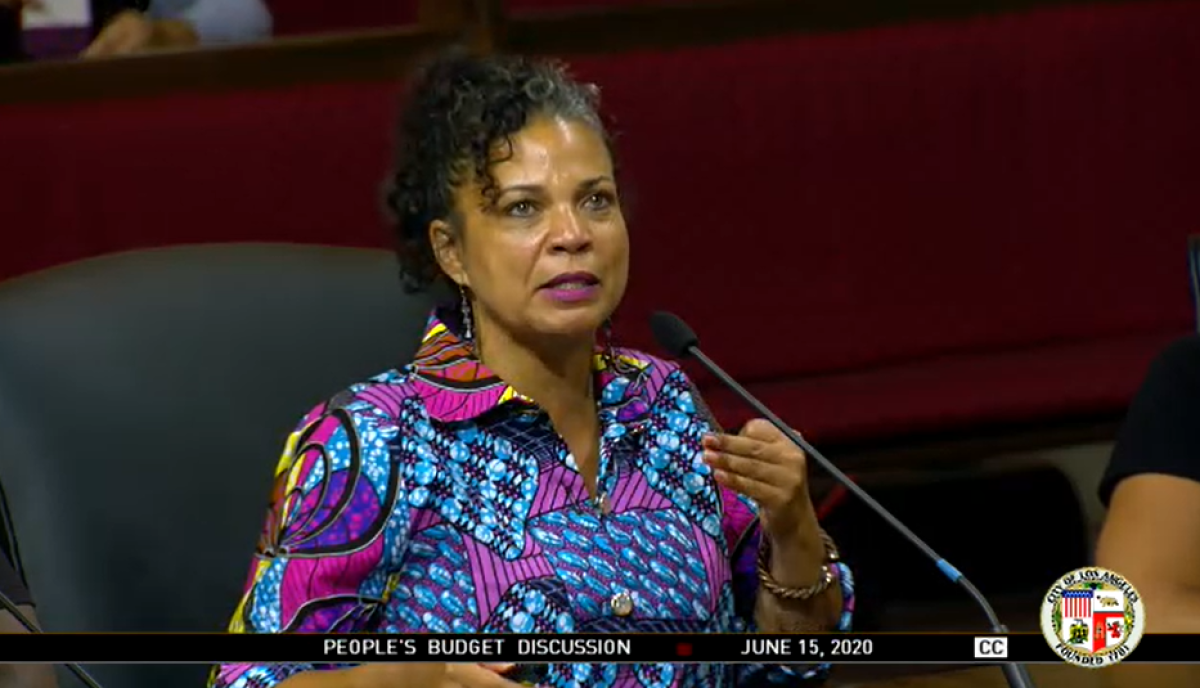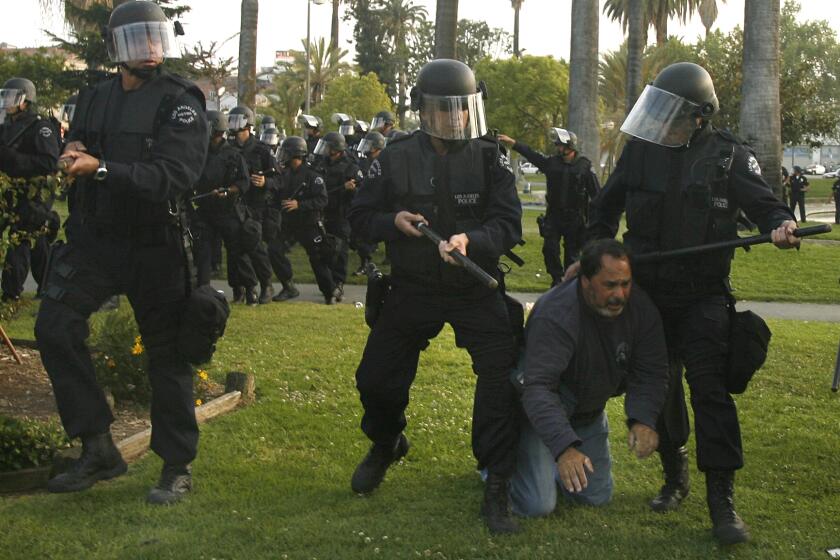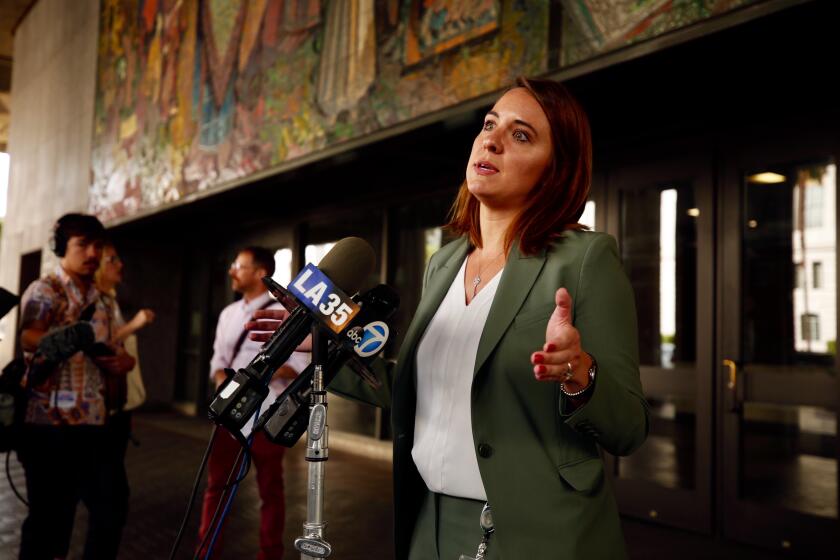Black Lives Matter leaders meet with L.A. politicians, saying ‘defund the police’

- Share via
In an extraordinary face-to-face meeting, a coalition of activists led by Black Lives Matter-Los Angeles urged members of the City Council on Monday to end the city’s reliance on police officers and embrace new strategies for keeping neighborhoods safe.
Seated in the council chamber at City Hall, activists told council members they have an opening to move money away from the L.A. Police Department and into mental health counselors, gang intervention workers and other public employees who can address trauma and prevent violence from breaking out.
“The world is speaking right now,” said Melina Abdullah, co-founder of Black Lives Matter-L.A., her voice choked with emotion. “They’re saying we don’t want a system of policing that puts targets on the backs of Black people especially, but also is a regular assailant and traumatizer of our entire community.
“We are saying defund the police,” Abdullah added later. “We’re also saying reimagine public safety.”

Nationwide, protesters and activists have been calling to “defund the police.” But what does it actually mean? And why are so many people calling for it to happen?
The remarks were part of a nearly two-hour special meeting devoted to the People’s Budget, an alternative spending plan for the city budget advanced by Black Lives Matter-L.A., Ground Game L.A., Sunrise Movement Los Angeles and a coalition of other activist organizations.
The session followed weeks of pressure from those groups, both before and after mass protests broke out nationally and in L.A. over the death of George Floyd in Minneapolis.
A decade ago, LAPD won praise for its handling of protests. What happened?
Five of the council’s 15 members, who have spent years overseeing a steady increase in police spending, attended the presentation. At least a few signaled an interest in the ideas put before them.
“It’s not complicated. It’s not rocket science,” said council President Nury Martinez, after hearing the activists’ presentation. “This is exactly how you reimagine neighborhoods.”
The People’s Budget effectively calls for widespread reductions at the LAPD, with the proceeds devoted to housing, healthcare, mental health, parks and many other services. Such a move would represent a dramatic shift in priorities for L.A., whose political leaders spent decades working to staff up the LAPD with 10,000 officers.
Councilman Paul Krekorian, who heads the council’s budget committee, said he expected city leaders to have an ongoing conversation about police spending. But Councilman Herb Wesson, whose ongoing bid for county supervisor received a $50,000 boost from the police union, said he would work to ensure the council doesn’t “miss this moment.”
“I don’t want to be part of history,” he said. “I want to make it.”
“But will you commit?” asked Akili, an organizer with Black Lives Matter-L.A., who was one of Monday’s presenters and goes by a single name.
“I just did,” Wesson replied.
Abdullah pressed council members to ignore demands from the Los Angeles Police Protective League to protect the LAPD from deep cuts. After Monday’s presentation, a spokesman for the league called the People’s Budget a “fairy tale that will end in a city of chaos, crime and fear.”
“Who will respond to the thousands of rapes, assaults, murders, and shootings that happen throughout this city if the ‘People’s Budget’ is enacted and the city fires 9,000 police officers?” said Dustin DeRollo, a spokesman for the union. “Every resident in this city deserves to feel safe and be safe in their neighborhood.”
The council is scheduled Tuesday to take up a request from Martinez, Wesson and several others to cut the LAPD’s budget by $100 million to $150 million, and put the money into other programs.

Mayor Eric Garcetti has also signed on to the idea. But so far, neither he nor the council has explained how those reductions would be achieved.
The council’s Budget and Finance Committee voted unanimously on Monday to move forward with the proposal, which won’t be finalized until later this month. But Councilman Paul Koretz, who represents part of the Westside, questioned whether those cuts were “arbitrary” — and said he’d heard from hundreds of constituents opposed to defunding the police.
“They’re fearful of slower response times and a lessened ability for the LAPD to protect residents from crime,” he said.
Even if the council approves the short-term reductions, the LAPD will be more expensive than it was just four years ago. Garcetti’s budget included a 7% increase for the LAPD in the budget for the coming fiscal year, which begins July 1.
Council members say they intend to rework the mayor’s spending plan. And the LAPD’s aggressive response to weeks of protests — including the use of batons and other weapons — have only intensified calls for cuts to the LAPD.
Kendrick Sampson, an actor and a founder of the group BLD PWR, which focuses on radical social change, told council members he had been struck repeatedly by rubber bullets during a protest that began in Pan Pacific Park. Those projectiles left him with a permanent scar on his chest, he said.
“We know that public safety is not policing,” said Sampson, whose group helped stage the protest.
The LAPD says tactical projectiles it fired were sponge and foam bullets, as well as beanbags.
The petition is the latest eruption of a longstanding debate within the Los Angeles Homeless Services Authority over how — or whether — to work with law enforcement.
The sight of the activists seated before council members to discuss defunding the LAPD marked something of a turning point. Abdullah said she had been pulled out of City Hall by police officers on several occasions but never invited to make a presentation like the one given Monday.
Abdullah said she appreciated the efforts of Martinez and Wesson, along with “tens of thousands of people” who pressured the city’s leaders to allow for a formal presentation. But she signaled that activists will need to keep pressing for the adoption of their plan.
“The verbal response we got was great,” she said. “We want a commitment.”
Times staff writer Kevin Rector contributed to this report.
More to Read
Sign up for Essential California
The most important California stories and recommendations in your inbox every morning.
You may occasionally receive promotional content from the Los Angeles Times.














